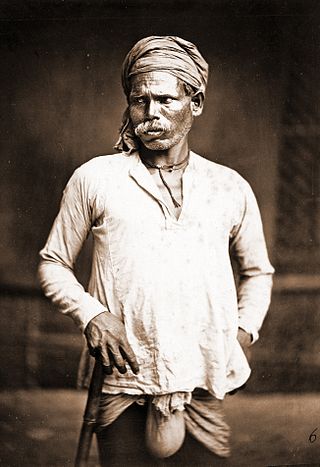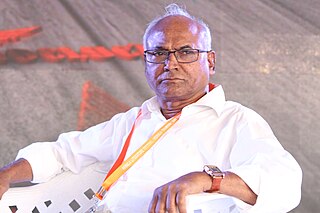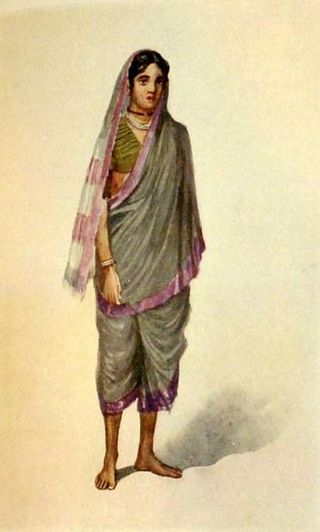Mala is a Telugu caste from the Indian states of Andhra Pradesh and Telangana. They are also present in smaller numbers in the states of Karnataka and Maharashtra. They are considered as Scheduled Caste (SC) or OBC depending on religious status by the Government of India. According to 2001 census data, Malas constituted 41.6 percent of the Scheduled Castes population in the then state of Andhra Pradesh, which also included the present state of Telangana.

Dalit is a term first coined by Jyotirao Phule for untouchables and outcasts. It is the lowest stratum of the castes in the Indian subcontinent. Dalits were excluded from the fourfold varna of the caste hierarchy and were seen as forming a fifth varna, also known by the name of Panchama. Several scholars have drawn parallels between Dalits and the Burakumin of Japan, the Baekjeong of Korea and the peasant class of the medieval European feudal system.

Kanshi Ram, also known as Bahujan Nayak or Manyavar, Sahab Kanshiram was an Indian politician and social reformer who worked for the upliftment and political mobilisation of the Bahujans, the backward or lower caste people including untouchable groups at the bottom of the caste system in India. Towards this end, Kanshi Ram founded Dalit Shoshit Samaj Sangharsh Samiti (DS-4), the All India Backwards (SC/ST/OBC) and Minorities Communities Employees' Federation (BAMCEF) in 1971 and the Bahujan Samaj Party (BSP) in 1984. He ceded leadership of the BSP to his protégé Mayawati who has served four terms as Chief Minister of Uttar Pradesh.

The Dom, also known as Domra, Domba, Domaka, Dombara and Dombari, are castes, or groups, scattered across India. Dom were a caste of drummer. According to Tantra scriptures, the Dom were engaged in the occupations of singing and playing music. Historically, they were considered an untouchable caste called the Dalits and their traditional occupation was the disposal and cremation of dead bodies. They are in the list of Scheduled caste for Reservation in India in the Indian states of Uttar Pradesh, Bihar, Odisha, Andhra Pradesh, Jharkhand and West Bengal.

Kancha Ilaiah Shepherd is an Indian political theorist, writer and a Dalit rights activist. He writes in both English and Telugu languages. His main domain of study and activism is the annihilation of caste.

Mahar is a caste found majorly in the state of Maharashtra and neighbouring areas. Most of Maharas trace their origin with amalgamation of Chamar craftmen from North India and local Maharathi Andhra-Naga tribe of Vidharbha(vessels of Mauryans) in times of first phase of urbanization in South India about 5th-4th century BCE. Mahavamsa mentions Maharathi were devout followers of Buddhism. Many Maharas believe Stupas of Bhon and Pauni were commissioned by Mahar chieftains in orders of Mauryan emperor Ashoka. An inscription from Bharhut Stupa dated to 2nd century BCE mentioned construction of a pillar was commissioned by Samaka, a student of Mahara. Maharas worship legendary farmer hero Mahasammat Raja who was the first farmer king elected by other farmers to rule them. The Maharas believe they are descendant of Mahasammat Raja,, the buddhist founder of Suriya Vassi Khattiyas or Kshtriyas of Solar dynasty.

Madiga is a Telugu caste from southern India. They mainly live in the states of Andhra Pradesh, Telangana and Karnataka, with a small minority in Tamil Nadu. Madigas are historically associated with the work of tannery, leatherwork and small handicrafts. Today, most are agricultural labourers. They are categorized as a Scheduled Caste by the Government of India. Within the Madiga community, there are various sub-castes include Bindla, Chindu, Dakkali, Mashti, Sangaris and the priestly class is known as Madiga Dasu.
Chuhra, also known as Bhanghi and Balmiki, is a Dalit caste in India and Pakistan. Populated regions include the Punjab region of India and Pakistan, as well as Uttar Pradesh in India, among other parts of the Indian subcontinent such as southern India. Their traditional occupation is sweeping, a "polluting" occupation that caused them to be considered untouchables in the caste system.
Jatav, also known as Jatava/Jatan/ Jatua/Jhusia /Jatia/Jatiya, is an Indian Dalit community that are considered to be a subcaste of the Chamar caste, who are classified as a Scheduled Caste under modern India's system of positive discrimination.
The caste system among South Asian Christians often reflects stratification by sect, location, and the caste of their predecessors. There exists evidence to show that Christian individuals have mobility within their respective castes. But, in some cases, social inertia caused by their old traditions and biases against other castes remain, causing caste system to persist among South Asian Christians, to some extent. Christian priests, nuns, Dalits and similar groups are found in India, Pakistan, Bangladesh, and Nepal.

Caste-related violence in India has occurred and continues to occur in various forms.

The Pasi is a Dalit (untouchable) community of India. Pasi refers to tapping toddy, a traditional occupation of the Pasi community. The Pasi are divided into Gujjar, Kaithwas, and Boria. They are classified as an Other Backward Class in Andhra Pradesh and Telangana. They live in the northern Indian states of Bihar and Uttar Pradesh.

B. Shyam Sunder was born in Aurangabad district in Bombay Presidency, British India. His father was B. Manicham, a railway employee, his mother Sudha Bai and Manik bai younger sister. He was a political thinker, jurist, prolific writer, parliamentarian and a revolutionary leader. In 1937, he founded the Dalit-Muslim unity movement at Parbhani in Aurangabad, Maharashtra and urged his people to join hands with Muslims. He was a legislator representing Andhra Pradesh and Mysore State.
Karamchedu massacre refers to an incident that occurred in Karamchedu, Bapatla district of Andhra Pradesh on 17 July 1985, where brutality by Kamma landlords against Madigas (Dalits) resulted in the killing of six Madigas and grievous injuries to many others. Three Madiga women were raped. Hundreds of Madigas in the village were displaced from their home & killed after their houses were burnt and looted.

Kalpana Saroj is an Indian business woman, entrepreneur and a TEDx speaker, and the chairperson of Kamani Tubes in Mumbai, India. Known as Indian Woman entrepreneur, she bought the distressed assets of Kamani Tubes Company and successfully steered the company back to profitability.
Savita Behen (1919-2009) was an Indian politician, social worker, educationist and a former member of Rajya Sabha, the upper house of the bicameral Indian Parliament. She was known to be an advocate of women empowerment and gender equality and was listed among the 3300 distinguished living women of the world by the Council for Parity Democracy in 1990. She was honoured by the Government of India in 1971 with Padma Shri, the fourth highest Indian civilian award.

Ants Among Elephants: An Untouchable Family and the Making of Modern India is a book by Sujatha Gidla on how India's untouchables (Dalits) struggle to overcome poverty and social ostracism due to the rigid caste system. The book deals with the humiliation and caste-based discrimination which Dalits face in India. The book also looks at the various levels of oppression faced due to caste, gender, and familial norms. Writing in The New York Review of Books, Pankaj Mishra says that the book "significantly enriches the new Dalit literature in English" and that the book is a "devastating critique" of India's independence leaders and the caste politics of the Naxalite movement in India.
Sanghapali Aruna, also known as Sanghapali Aruna Lohitakshi, is a human rights activist from India, best known for her work on Dalit women's rights. She is the Executive Director of Project Mukti.
Radhika Vemula is an Indian activist for Dalit rights and against caste based discrimination.











